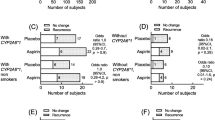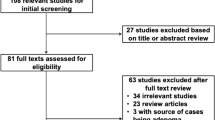Abstract
Purpose
The cytochrome P450 2C9 enzyme (CYP2C9) is involved in metabolism of endogenous compounds, drugs, and procarcinogens. Two common nonsynonymous polymorphisms in CYP2C9 are associated with reduced enzyme activity: CYP2C9*2 (rs1799853, R144C) and CYP2C9*3 (rs1057910, I359L).
Methods
We investigated whether CYP2C9 genotype was associated with risk of colorectal adenoma and/or modified associations with aspirin treatment or cigarette smoking in a cohort of 928 participants in a randomized trial of aspirin chemoprevention. Generalized linear regression was used to compute relative risks (RRs) and 95 % confidence intervals (95 % CIs). Multiplicative interactions terms were used to assess effect modification.
Results
CYP2C9 genotype was associated with increased risks for adenoma recurrence of 29 % (RR = 1.29, 95 % CI 1.09–1.51) for ≥1 variant allele (CYP2C9*2 or *3) and 47 % (RR = 1.47, 95 % CI 1.19–1.83) for ≥1 CYP2C9*3 allele. The risk for advanced lesions or multiple (≥3) adenomas was increased by 64 % (RR = 1.64, 95 % CI 1.18–2.28) for ≥1 variant allele (CYP2C9*2 or *3) and 79 % (RR = 1.79, 95 % CI 1.16–2.75) for ≥1 CYP2C9*3 allele. Genotype modified associations with smoking, but not aspirin treatment. The adenoma risk was increased by 26 % (RR = 1.26, 95 % CI 0.99–1.58) for former smokers and 60 % (RR = 1.60, 95 % CI 1.19–2.15) for current smokers among wild-type individuals, but there was no increased risk among individuals with ≥1 variant allele (CYP2C9*2 or *3) (p interaction = 0.04).
Conclusions
Carriers of CYP2C9 variants with lower enzyme activity have increased overall risk of colorectal adenoma but reduced adenoma risk associated with cigarette smoking. These results may be due to effects on the synthesis of endogenous eicosanoids and/or reduced activation of procarcinogens in smoke by CYP2C9 variants.
Similar content being viewed by others
References
Jemal A, Siegel R, Xu J, Ward E (2010) Cancer statistics, 2010. CA Cancer J Clin 60:277–300
Nebert DW, Russell DW (2002) Clinical importance of the cytochromes P450. Lancet 360:1155–1162
Panigrahy D, Kaipainen A, Greene ER, Huang S (2010) Cytochrome P450-derived eicosanoids: the neglected pathway in cancer. Cancer Metastasis Rev 29:723–735
Shou M, Krausz KW, Gonzalez FJ, Gelboin HV (1996) Metabolic activation of the potent carcinogen dibenzo[a, h]anthracene by cDNA-expressed human cytochromes P450. Arch Biochem Biophys 328:201–207
Yun CH, Shimada T, Guengerich FP (1992) Roles of human liver cytochrome P4502C and 3A enzymes in the 3-hydroxylation of benzo(a)pyrene. Cancer Res 52:1868–1874
Mo SL, Zhou ZW, Yang LP, Wei MQ, Zhou SF (2009) New insights into the structural features and functional relevance of human cytochrome P450 2C9. Part I. Curr Drug Metab 10:1075–1126
Shou M, Korzekwa KR, Crespi CL, Gonzalez FJ, Gelboin HV (1994) The role of 12 cDNA-expressed human, rodent, and rabbit cytochromes P450 in the metabolism of benzo[a]pyrene and benzo[a]pyrene trans-7,8-dihydrodiol. Mol Carcinog 10:159–168
Zhou SF, Zhou ZW, Huang M (2010) Polymorphisms of human cytochrome P450 2C9 and the functional relevance. Toxicology 278:165–188
Rokitta D, Fuhr U (2010) Comparison of enzyme kinetic parameters obtained in vitro for reactions mediated by human CYP2C enzymes including major CYP2C9 variants. Curr Drug Metab 11:153–161
Wang B, Wang J, Huang SQ, Su HH, Zhou SF (2009) Genetic polymorphism of the human cytochrome P450 2C9 gene and its clinical significance. Curr Drug Metab 10:781–834
Van Booven D, Marsh S, McLeod H et al (2010) Cytochrome P450 2C9-CYP2C9. Pharmacogenet Genomics 20:277–281
Lindh JD, Holm L, Andersson ML, Rane A (2009) Influence of CYP2C9 genotype on warfarin dose requirements–a systematic review and meta-analysis. Eur J Clin Pharmacol 65:365–375
Bigler J, Whitton J, Lampe JW, Fosdick L, Bostick RM, Potter JD (2001) CYP2C9 and UGT1A6 genotypes modulate the protective effect of aspirin on colon adenoma risk. Cancer Res 61:3566–3569
Chan AT, Tranah GJ, Giovannucci EL, Hunter DJ, Fuchs CS (2004) A prospective study of genetic polymorphisms in the cytochrome P-450 2C9 enzyme and the risk for distal colorectal adenoma. Clin Gastroenterol Hepatol 2:704–712
Hubner RA, Muir KR, Liu JF et al (2006) Genetic variants of UGT1A6 influence risk of colorectal adenoma recurrence. Clin Cancer Res 12:6585–6589
Samowitz WS, Wolff RK, Curtin K et al (2006) Interactions between CYP2C9 and UGT1A6 polymorphisms and nonsteroidal anti-inflammatory drugs in colorectal cancer prevention. Clin Gastroenterol Hepatol 4:894–901
Chan AT, Zauber AG, Hsu M et al (2009) Cytochrome P450 2C9 variants influence response to celecoxib for prevention of colorectal adenoma. Gastroenterology 136(2127–36):e1
Cleary SP, Cotterchio M, Shi E, Gallinger S, Harper P (2010) Cigarette smoking, genetic variants in carcinogen-metabolizing enzymes, and colorectal cancer risk. Am J Epidemiol 172:1000–1014
Northwood EL, Elliott F, Forman D et al (2010) Polymorphisms in xenobiotic metabolizing enzymes and diet influence colorectal adenoma risk. Pharmacogenet Genomics 20:315–326
Baron JA, Cole BF, Sandler RS et al (2003) A randomized trial of aspirin to prevent colorectal adenomas. N Engl J Med 348:891–899
Cole BF, Baron JA, Sandler RS et al (2007) Folic acid for the prevention of colorectal adenomas: a randomized clinical trial. JAMA 297:2351–2359
Enayetallah AE, French RA, Thibodeau MS, Grant DF (2004) Distribution of soluble epoxide hydrolase and of cytochrome P450 2C8, 2C9, and 2J2 in human tissues. J Histochem Cytochem 52:447–454
Enayetallah AE, French RA, Grant DF (2006) Distribution of soluble epoxide hydrolase, cytochrome P450 2C8, 2C9 and 2J2 in human malignant neoplasms. J Mol Histol 37:133–141
Martinez ME, Baron JA, Lieberman DA et al (2009) A pooled analysis of advanced colorectal neoplasia diagnoses after colonoscopic polypectomy. Gastroenterology 136:832–841
Yasar U, Lundgren S, Eliasson E et al (2002) Linkage between the CYP2C8 and CYP2C9 genetic polymorphisms. Biochem Biophys Res Commun 299:25–28
Yasar U, Bennet AM, Eliasson E et al (2003) Allelic variants of cytochromes P450 2C modify the risk for acute myocardial infarction. Pharmacogenetics 13:715–720
Cross JT, Poole EM, Ulrich CM (2008) A review of gene-drug interactions for nonsteroidal anti-inflammatory drug use in preventing colorectal neoplasia. Pharmacogenomics J 8:237–247
Ulrich CM, Bigler J, Potter JD (2006) Non-steroidal anti-inflammatory drugs for cancer prevention: promise, perils and pharmacogenetics. Nat Rev Cancer 6:130–140
The Tobacco and Genetics Consortium (2010) Genome-wide meta-analyses identify multiple loci associated with smoking behavior. Nat Genet 42:441–447
Loukola A, Broms U, Maunu H et al (2008) Linkage of nicotine dependence and smoking behavior on 10q, 7q and 11p in twins with homogeneous genetic background. Pharmacogenomics J 8:209–219
Wassenaar CA, Dong Q, Wei Q, Amos CI, Spitz MR, Tyndale RF (2011) Relationship between CYP2A6 and CHRNA5-CHRNA3-CHRNB4 variation and smoking behaviors and lung cancer risk. J Natl Cancer Inst 103:1342–1346
Shimada T (2006) Xenobiotic-metabolizing enzymes involved in activation and detoxification of carcinogenic polycyclic aromatic hydrocarbons. Drug Metab Pharmacokinet 21:257–276
Ding YS, Ashley DL, Watson CH (2007) Determination of 10 carcinogenic polycyclic aromatic hydrocarbons in mainstream cigarette smoke. J Agric Food Chem 55:5966–5973
Botteri E, Iodice S, Raimondi S, Maisonneuve P, Lowenfels AB (2008) Cigarette smoking and adenomatous polyps: a meta-analysis. Gastroenterology 134:388–395
Botteri E, Iodice S, Bagnardi V, Raimondi S, Lowenfels AB, Maisonneuve P (2008) Smoking and colorectal cancer: a meta-analysis. JAMA 300:2765–2778
Tsoi KK, Pau CY, Wu WK, Chan FK, Griffiths S, Sung JJ (2009) Cigarette smoking and the risk of colorectal cancer: a meta-analysis of prospective cohort studies. Clin Gastroenterol Hepatol 7(682–8):e1–e5
Limsui D, Vierkant RA, Tillmans LS et al (2010) Cigarette smoking and colorectal cancer risk by molecularly defined subtypes. J Natl Cancer Inst 102:1012–1022
Boland CR, Goel A (2010) Clearing the air on smoking and colorectal cancer. J Natl Cancer Inst 102:996–997
Campbell PT, Curtin K, Ulrich CM et al (2009) Mismatch repair polymorphisms and risk of colon cancer, tumour microsatellite instability and interactions with lifestyle factors. Gut 58:661–667
Acknowledgments
The authors are grateful to the co-investigators, study coordinators, and participants in the Aspirin/Folate Polyp Prevention Study who made this research possible and to Bayer for providing the aspirin and placebo tablets for the clinical trial. This work was supported by grants from the National Institutes of Health, National Cancer Institute: R01 CA59005 to JA Baron; R03 CA136026 to CM Ulrich.
Author information
Authors and Affiliations
Corresponding author
Rights and permissions
About this article
Cite this article
Barry, E.L., Poole, E.M., Baron, J.A. et al. CYP2C9 variants increase risk of colorectal adenoma recurrence and modify associations with smoking but not aspirin treatment. Cancer Causes Control 24, 47–54 (2013). https://doi.org/10.1007/s10552-012-0088-6
Received:
Accepted:
Published:
Issue Date:
DOI: https://doi.org/10.1007/s10552-012-0088-6




